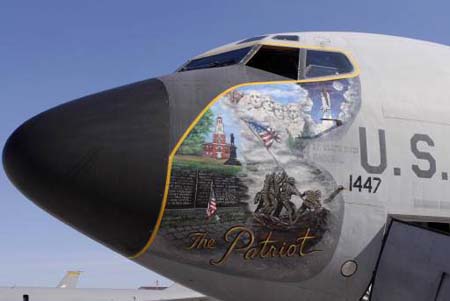Boeing a nd Northrop Grumman yesterday submitted the final proposals for their respective KC-767 and KC-30 tanker aircraft to the Air Force in the multi-billion-dollar KC-X tanker-recapitalization contest. “We believe the KC-767 Advanced Tanker will be evaluated as the most capable, technologically advanced and affordable tanker for America,” Jim Albaugh, president and CEO of Boeing Integrated Defense Systems, said in a company release. Boeing said the KC-767 is tailored “to meet or exceed all of the Air Force’s mission requirements” and noted that, as a medium-sized aircraft, it would provide the operational flexibility that a larger platform cannot. The company took a few direct swipes at its competitor, saying the comparatively larger KC-30 would be “oversized” and “provide unnecessary capacity.” Conversely, Ronald Sugar, Northrop Grumman chairman and chief executive officer, said the KC-30 “not only offers greater capabilities and versatility than any tanker available today, it offers the lowest entry risk” and “meets all of the Air Force’s key requirements.” The KC-30, a militarized derivative of the Airbus A330 commercial airliner, “is clearly a ‘game changer,’ ” he continued, “in that it is the only solution to provide the potential breakthrough in future Air Force air mobility capability as the C-17 did in replacing the venerable C-141.” The Air Force intends to acquire up to 179 KC-X aircraft to replace the oldest of its Eisenhower-era KC-135 tankers. February was the expected contract award month, but senior service officials have said the date may slip since they intend to complete the extensive source-selection process properly and not rush a decision.
nd Northrop Grumman yesterday submitted the final proposals for their respective KC-767 and KC-30 tanker aircraft to the Air Force in the multi-billion-dollar KC-X tanker-recapitalization contest. “We believe the KC-767 Advanced Tanker will be evaluated as the most capable, technologically advanced and affordable tanker for America,” Jim Albaugh, president and CEO of Boeing Integrated Defense Systems, said in a company release. Boeing said the KC-767 is tailored “to meet or exceed all of the Air Force’s mission requirements” and noted that, as a medium-sized aircraft, it would provide the operational flexibility that a larger platform cannot. The company took a few direct swipes at its competitor, saying the comparatively larger KC-30 would be “oversized” and “provide unnecessary capacity.” Conversely, Ronald Sugar, Northrop Grumman chairman and chief executive officer, said the KC-30 “not only offers greater capabilities and versatility than any tanker available today, it offers the lowest entry risk” and “meets all of the Air Force’s key requirements.” The KC-30, a militarized derivative of the Airbus A330 commercial airliner, “is clearly a ‘game changer,’ ” he continued, “in that it is the only solution to provide the potential breakthrough in future Air Force air mobility capability as the C-17 did in replacing the venerable C-141.” The Air Force intends to acquire up to 179 KC-X aircraft to replace the oldest of its Eisenhower-era KC-135 tankers. February was the expected contract award month, but senior service officials have said the date may slip since they intend to complete the extensive source-selection process properly and not rush a decision.
F-35As from the Vermont Air National Guard have deployed to Puerto Rico in recent days, continuing a major buildup of U.S. Air Force assets in Latin America aimed at combating drug trafficking and pressuring the regime of Venezuelan leader Nicolas Maduro.

